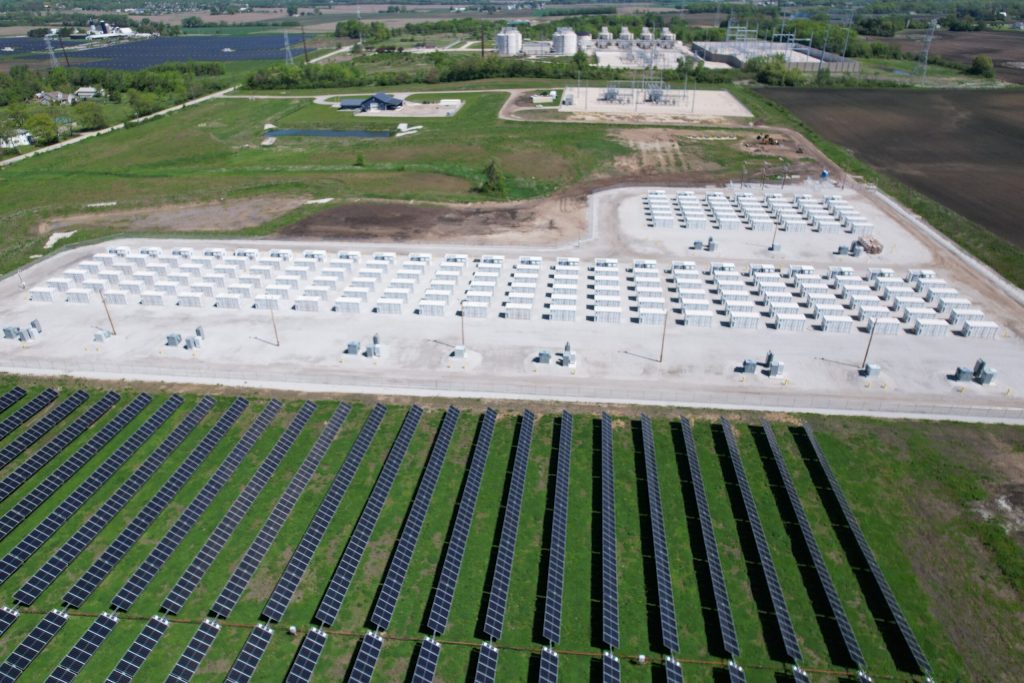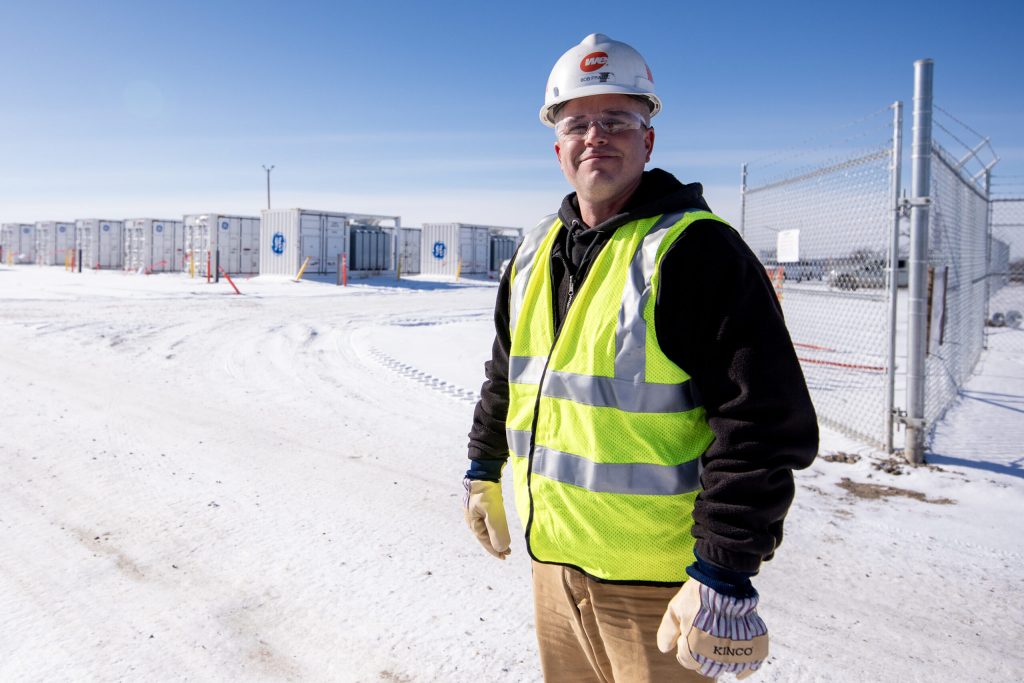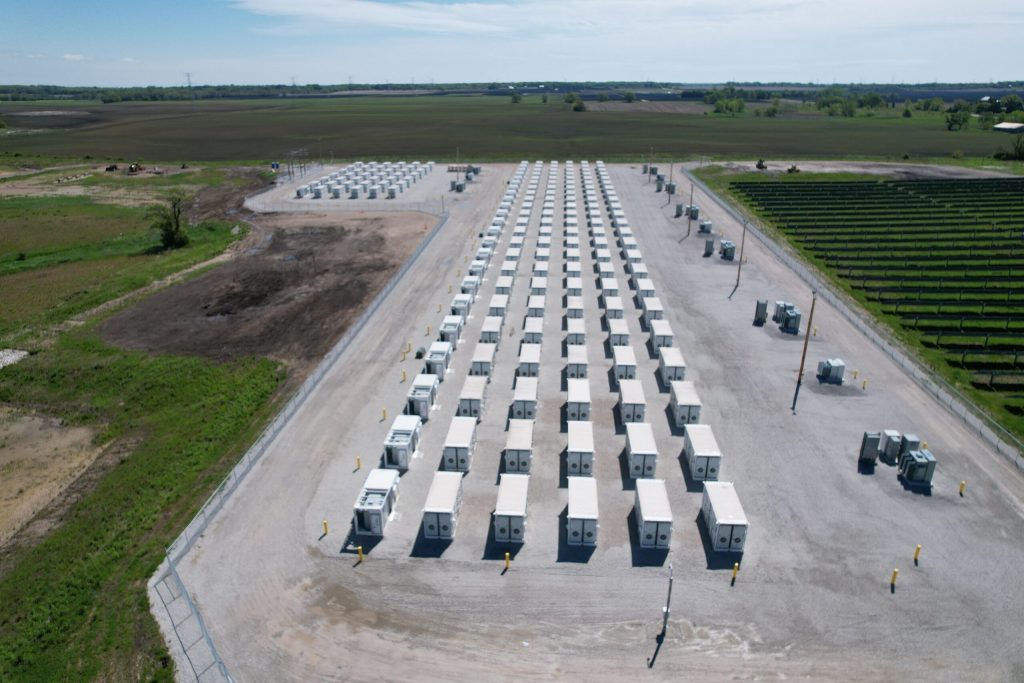Wisconsin’s First Large-Scale Battery Storage System Comes Online
$574 million Kenosha County project could power 130,000 homes for 4 hours.

The state’s first large utility-scale battery storage project came online in southeastern Wisconsin in June 2025 at the Paris Solar-Battery Park in Kenosha County. Photo courtesy of We Energies
The state’s first large utility-scale battery storage project came online in southeastern Wisconsin this month, providing enough storage to power more than 130,000 homes for four hours.
We Energies announced Tuesday that the last major piece of the Paris Solar-Battery Park in Kenosha County was online.
“Bringing Wisconsin’s first large scale battery storage project online is historic and continues our commitment to provide customers reliable and affordable energy,” We Energies President Mike Hooper said in a statement.
We Energies is the majority owner of the Paris site, while Wisconsin Public Service and Madison Gas and Electric both have an ownership stake.
The project came in more than $100 million over initial projections. It initially had a $400 million price tag when it was proposed to the Public Service Commission in 2021. But an April 2025 project update said the total project cost was more than $574 million through the end of March.
Brendan Conway, a spokesperson for We Energies’ parent company WEC Energy Group, said some of those cost overruns can be attributed to inflation after the COVID-19 pandemic, while others were caused by delays importing solar panels.
“We were impacted by the supply chain issues with COVID, the cost increases, some of the labor increases, and that’s reflected in what happened here,” he said. “We’ve kept the commission apprised all along, and now that this is in service we [will] then look for it to be recovered in the future.”

Paris Solar Park supervisor Bob Frazee stands at the battery site near the solar farm Friday, Jan. 24, 2025, in Union Grove, Wis. Angela Major/WPR
Tom Content, executive director of the Citizens Utility Board of Wisconsin, said he anticipates the utilities will ask to recover the cost overruns in their rate cases. He said the higher costs in this project appear to be related to the pandemic, but projects going over budget has been a growing concern around utility construction.
“It’s really important for the PSC to really take a hard look at these overruns and whether customers should be on the hook for them,” he said. “There should be a balance between how much shareholders have to pay and how much customers have to pay, so that customers aren’t stuck with the whole thing.”
Conway said solar and batteries will continue to be important pieces of the company’s energy mix in the coming years.
He said solar energy is very reliable on a bright and sunny day, but generation drops “almost off a cliff” when the sun goes down. The batteries are meant to help “stabilize the grid” during those times.
“We’re able to use excess solar throughout the day to fill those batteries,” Conway said. “When we release it, it’s just excess sunshine that’s going back into the grid.”
Ciaran Gallagher, energy and air manager for the nonprofit Clean Wisconsin, said the new battery storage was a welcome addition, but she was disheartened that it came on the heels of the utility receiving approval for two new natural gas plants. One of those plants is planned in Oak Creek and the other is planned in Paris.
“We’re happy to celebrate more battery storage coming online, but we just want to note that We Energies is still doubling down on gas,” Gallagher said. “The utility is trying to shift focus when they know that their customers and residents are rightfully upset.”
Beyond the Paris project, WEC Energy Group has several more battery storage projects in development, ranging from 50 megawatts to 165 megawatts of storage. Those projects are slated to come online from 2026 through 2028.

The battery storage systems at the Paris Solar-Battery Park in Kenosha County are seen in this image captured by a drone. Photo courtesy of We Energies
The company estimates its strategy to decommission aging coal plants while bringing new renewable energy, battery storage and natural gas generation onto the grid will save customers $2 billion over the next two decades, Conway said.
But the utility’s savings from federal clean energy tax credits are included in that estimate, he said.
Conway said it’s not clear how the loss of tax credits would impact the utility’s future renewable energy projects. He also said the utility has been in communication with Wisconsin’s congressional delegation about the issue.
“At this point, it would be too soon to say, ‘Here’s what will happen,’ because the Senate still needs to take it up,” Conway said. “We’re keeping a close eye on it. We’re talking with people in D.C. and here in Wisconsin.”
Editor’s note: The Citizen’s Utility Board is a sponsor of Wisconsin Public Radio.
Wisconsin’s first large-scale battery storage system comes online in Kenosha County was originally published by Wisconsin Public Radio.
If you think stories like this are important, become a member of Urban Milwaukee and help support real, independent journalism. Plus you get some cool added benefits.






















Thank you for this reporting. I would be interested to learn more about the composition and life cycle expectation for these battery units.